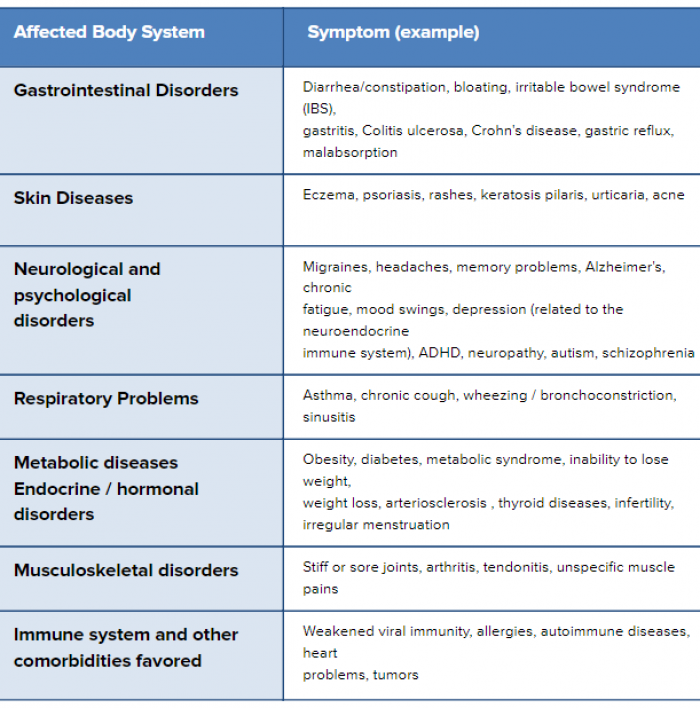
The Alcat Test is a tool to help you succeed in providing for your patients. Your biggest question might be, “how do I identify patients that could benefit from the Alcat Test?” The easy answer is all of them. There isn’t a list of checks you need in order to see and feel benefits from an Alcat Test.
The Alcat Test is used both for prevention (and performance optimization) to detect the cause of non-specific symptoms, as well as for optimizing disease-therapy, which may correlate with a chronically activated innate immune system (silent inflammation) or malfunction of the innate immune system (Table 1).
The Alcat Test identifies the foods, chemicals, and molds that are causing inflammation in the body. Patients are probably coming to you because they feel something is wrong with them and up until this point nothing is helping or have received only short term relief.
Tab. 1: The Alcat Test is frequently used for chronic diseases associated with a chronically activated innate immune system (silent inflammation).

We put food in our bodies every day. That food helps provide the energy and nutrients our whole body needs to obtain peak performance.
If we are eating foods that our body has deemed unacceptable and is causing our body more harm than good, then we are preventing ourselves from maximum, symptom-free, health.
It is hard to understand that possibly the healthy kale or mushrooms they are eating are actually causing more inflammation.
The benefits of following an Alcat Test based eating plan has been shown successful in numerous studies that tracked not only healthy weight loss and BMI but also overall wellness improvement in symptom questionnaires. This test can help solve problems with digestion, skin, muscle and joint pain, migraines, brain fog, depression and ADHD among many other health benefits.
Alcat methods (technically termed flow cytometry and impedance) are sensitive enough to detect early cellular changes, a distinct advantage over other methods. The Alcat has been validated as a clinically sensitive and specific test. Avoidance of foods and chemicals identified by Alcat led to positive improvements in test subjects for many of the symptoms listed in the table above. More than 35 studies have been conducted using the Alcat Test, confirming it as a useful tool for detecting and addressing food and chemical sensitivities.
Case Study: A 38 year old patient presented with severe facial dermatitis, candida infection and asthma. She had been given the run-around throughout the medical community with all testing indicating that no disease was present. The Alcat Test results showed reaction with dairy, corn, salmon, apricot, onion and garlic. Removal of these foods from the diet improved all of her symptoms in 4 weeks and total elimation of ysmptoms at the 12 week follow-up.
For instance, the late Robert Atkins of low-carbohydrate diet fame once questioned the author as to why all of his kosher pediatric patients were testing positive to pork on the Alcat Test, when, by definition, none of these patients had a prior exposure. A reasonable viewpoint if in fact, food intolerance were a function of specific immunity. However, it is not. Rather, food intolerance is primarily a function of innate immunity.
A patient might be seeking advice to help with IBS and after implementing the Alcat Test based eating plan sees improvements in not only digestion but also waking up more rested and less body fatigue they didn’t even know they were experiencing.
The Effect of The ALCAT Test Diet Therapy for Food Sensitivity in Patient’s With Obesity
Mohammed Akmal1, Rula Khalil1, Saeed Ahmed Khan2, Mohd Al Khalili3
1 Dubai Specialized Medical Center & Medical Research Labs, Dubai, UAE; 2 Dubai Pharmacy College, Dubai, UAE;
3 Al Abbar Laboratories for Research and Medical Analysis, Dubai, UAE
This study was designed to determine whether people who could not lose weight on a low calorie diet could achieve their weight loss using the results from ALCAT test. A group of 27 patients with 14 males and 13 females with mean age of 42.77 ±6.23 years and with a mean height of 168.66 ±2.09cm with obesity who had difficulty losing weight when they adhered to a reduced calorie diet were evaluated for specific white blood cell food induced reactions. Patients were exhibiting multiple symptoms including: obesity, gastrointestinal reflux, chronic fatigue, headache and other chronic disorders associated with food sensitivities.
Twelve weeks after following the ALCAT diet plans, we observed a significant decrease in Body weight, Total Body fat percent and Body Mass Index. Body weight was decreased significantly from 91.37 ±10.56 to 74.6 ±6.76kg, Total Body fat % was decreased significantly from 37.1 ±7.16 to 27.66 ±6.52 % and Body Mass Index was significantly decreased from 32.1 ±3.8 to 26.1 ± 2.63kg/m2.
This study suggests that delayed food hyper sensitivities may interfere with weight loss regardless of calorie restrictions. Also the beneficial effects of improved sense of well being and improvement of gastrointestinal conditions were observed collateral benefits consistent with an overall normalization of immune activity.
Middle East Journal of Family Medicine, April 2009 – Volume 7, Issue 3












